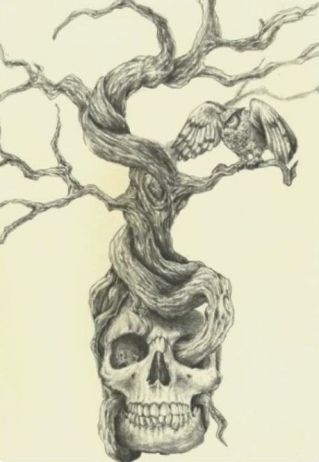William Blake’s “Proverbs of Hell” aims to demonstrate the importance of questioning accepted social ideals, as it is the only manner by which new knowledge can be produced. One aphorism that especially stood out to me was the second line: “Drive your cart and your plow over the bones of the dead.” The tools in the quote represent skepticism and questioning while the “bones of the dead” are the fixed ideologies that have governed societies for years. The usage of “your,” puts the power in the readers hands and reveals they have the tools necessary to deconstruct stagnant views. In critically looking at the elements of the ideologies in question, their contradictions are revealed and one gains a holistic knowledge that acknowledges the varying sides.
Despite The new perspectives that sprout from this dismantling do not intend to invalidate the existence of the old views, rather they are one and the same. The ideologies of generations past have been a form of understanding the world. There must exist a principle to question and take apart in order to create a new outlook. However, as people challenge the efficacy of these beliefs and look at them through different angles, new truths are revealed. The “bones of the dead” once held up and gave structure to a society. Now they serve as the foundation or soil, which has been exhausted by fixed ideologies whose narrow truths prevent new revelations, for the cart to roll over and the plow to till. Just as questioning ravages accepted beliefs, the plow will desecrate and turn over the bones and earth to make the soil fertile for the seed of new ideas to be sown and grown. These ideas come from considering what has already been socially established as true and adding to or disputing them. Therefore, the pre-established beliefs represented by the bones, never really disappear nor are they replaced by the newfound interpretation but are simply modified. Both are part of the same of learning and obtaining wisdom. They are the knowing and the discovering, both of which are not definite and will continue to be modified as people challenge them. Thus, Blake’s proverb tells us no view, whether ancient or new, is inaccurate but neither is a single one the absolute truth. Instead, individual perspectives are only parts of the greater truth. Wisdom is acknowledging the many and emerging contradictions, allowing for knowledge to grow instead of being confined.
-Wendy Gutierrez




Great post Wendy! It was very thought provoking and I really like a lot of the ideas you bring to the table, such as your most original one being that the ideologies of the the past and present are the same when a lot of people might consider them to be entirely different and archaic, especially when people try to distance themselves from older or newer values. I think one way you can improve to hammer this idea home is to give a real world example of an older ideology that has been mended overtime, and show that despite its changes, it is still that same ideology at its core.
–Jose